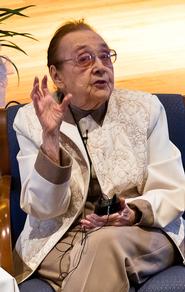
“I still don’t believe it happened.” These words were a soft confession from Utican Helen Sperling, a Polish Jew and 93-year-old Holocaust survivor. A captivated audience sat in the College Chapel on April 9 waiting to hear Sperling’s story.
Hamilton’s Hillel organization began the evening with a recitation of the Kaddish, the Jewish prayer of mourning, followed by the lighting of a group of candles for the 6 million Jews killed in the Holocaust. The mood in the chapel was somber and the silence seemed heavy as Sperling began her tale.
Sperling, the last of her family alive after the death of her younger brother eight years ago, provided a detailed description of her home life before the war. She gave several anecdotes about her parents and then explained the early stages of the Nazi takeover process. She explained that no one took warning from what Hitler published in Mein Kampf and refused to believe that something so horrifying could happen to any group. As she would continue to do throughout the two-hour lecture, Sperling lamented the stupidity and naivety of her youth.
Her recounting spanned the multiple moves and lifestyle changes her family had to make when being moved to the ghetto, as well as her memories of being transported on the cattle cars and sorted in the concentration camps. She delved into intense detail about the mentality of the Nazis and of the conditions in which she, like so many other millions of Jews, suffered through during the Holocaust. She spoke of her family, all of whom, except her younger brother, went to the gas chambers. Sperling spoke of the innumerable inhumane atrocities committed at Hitler’s camps and spared few details about her years in the Ravensbrück transition camp and the Buchenwald work camp.
“I don’t know how to make you understand the numbers,” she remarked, while trying various statistics. More than a million and a half children under 12-years-old were murdered, two-thirds of her transport died, and each new transport carried 6,000 more victims to the concentration camps, from which only a fraction would return. Although the numbers seemed incomprehensible, it mattered little when Sperling held up two battered black and white photographs, framed in aging silver, toward the crowd. “These are my mother and my father,” she cried, “They are not a number!”
Despite recounting her story hundreds of times, Sperling admitted that “it never stops hurting.” She revealed that she discovered her will to live in a concentration camp munitions factory and of her encounter with Dr. Mengele, the Angel of Death. By the time she was rescued by American soldiers, she weighed 60 pounds and had something growing in her stomach. A death camp doctor and allied prisoner operated and saved her life. Sperling wrote him Christmas cards until his death 15 years ago, all unanswered.
Although her life resumed after WWII, Sperling is haunted by the memories of years long since passed and the unimaginable horrors that she experienced. “The days are mine,” she commented, “but the nights still belong to Hitler.” After immigrating to the United States, Sperling met a fellow survivor, whom she married. Rendered infertile by the conditions of six years of imprisonment and torture, Sperling and her husband adopted two children and raised them in NYC then Ann Arbor.
When she finished her story, she confided in her rapt audience, saying “I hope and pray that what I tell you makes a difference in your life, that it makes you more aware, smarter than I was at your age.” During her years of oppression and suffering, Sperling often asked herself where the world was and why they hadn’t come to save her. Now, she says, she is the world and we are the world and we “don’t have the right to be silent.”
“Thou shalt not be a bystander,” the phrase written on the Anti-Defamation League bracelets being sold at the event, rang through the chapel falling on ears wide open.
Posted April 10, 2013
